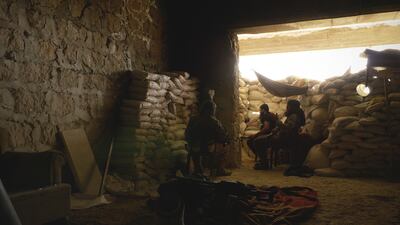Norwegian journalist and documentary filmmaker Paul Salahadin Refsdal's latest film offers a rare and shocking insight into the day to-day-lives of men preparing to become Al Qaeda suicide bombers. The film has raised ethical issues with broadcasters disturbed by its subjects and content.
He spent six weeks embedded with members of Al Nusra Front, the Syrian branch of the extremist organisation in the war-ravaged Levantine nation. The result is the film Dugma: The Button, which chronicles the day-to-day lives of four would-be suicide bombers and unravels their motivations. The film was released last week on iTunes.
Refsdal has become something of a specialist at covering the normally hidden activities of members of radical and extremist groups, having previously filmed with rebels in Sri Lanka, Kosovo, Peru, Chechnya and Afghanistan.
But even by his own standards, getting what he claims to be unrestricted access to such a notoriously criminal group proved sometimes bizarre.
“It was a very time-consuming process,” he says. “I started in summer 2013, when I decided I wanted to make a film about Al Qaeda in Syria, so I just went and tried to meet them. I didn’t get far initially and went home empty-handed because everything was in chaos following the split with the IS,” the group also known as ISIL. He returned to Syria in December the same year.
“I met a local commander who eventually said I could return the following summer,” he says. “But when I went back, he was transferred to another area within a couple of days and I had to start from scratch.”
Then things got even more strange, as he became involved in a surreal process. He managed to contact Al Qaeda’s “media section”, and was told to prepare a formal application, complete with CV, references and examples of his previous work.
The approval was granted, possibly due, in part, to one of his previous films, 2010's Captured by Taliban (also known as Taliban: Behind the Mask).
“When the US troops killed Osama bin Laden, they took his computers and on one of them he had saved a letter to the [Al Qaeda] media centre making suggestions on how to commemorate the 10th anniversary of the Twin Towers attack,” says Refsdal. “He gave names of about 10 journalists that should be given some kind of package and he specified a Norwegian journalist who had made a film” about the Taliban.
Such contact with groups like Al Qaeda and the Taliban might have been expected to raise the justifiable attention of the intelligence services. The CIA, in particular, might have been expected to be interested. Yet so far, Refsdal has seemed to have avoided any direct curiosity.
“I haven’t noticed anything,” he says. “Here in Norway, we had a case last year where a documentary-maker had his hard disk confiscated because he’d met with some jihadis heading for Syria, but the supreme court judged it illegal – so I think it’s unlikely anything will happen here in Norway.”
At the time we spoke, however, Refsdal was planning a trip to the UK.
“One of the jihadis in the film, Abu Basir Al Britani, is a UK citizen,” he says. “I would expect the UK [intelligence] services may have some interest or questions.”
Refsdal’s film does not condone the actions of its subjects – it is in fact a model of objective documentary filmmaking, despite the gruesome nature of his subjects and their plans.
Has he ever been taken to task about this or has it been suggested that he should perhaps take a less neutral stance?
“Audience reactions at festivals and screenings have been almost universally positive,” he says. He continued that people seemed to want the opportunity to learn about these radicals from an inside perspective.
“The problem I’ve had has been with broadcasters. They seem very afraid to air this film as it is,” he says. “That surprised me, because I thought the media had developed beyond that. ”
On Norwegian TV, for example, the film was re-edited, with an extra half-hour of third-party footage added showing bombing by all sides in the conflict and an “ethical editor” describing events and explaining why the film was being shown. German broadcasters cut 20 minutes out of the film.
“I don’t want to intervene or tell people what to think,” says Refsdal. “I just want to show it as it is.”
• Dugma: The Button is available now on iTunes
cnewbould@thenational.ae

